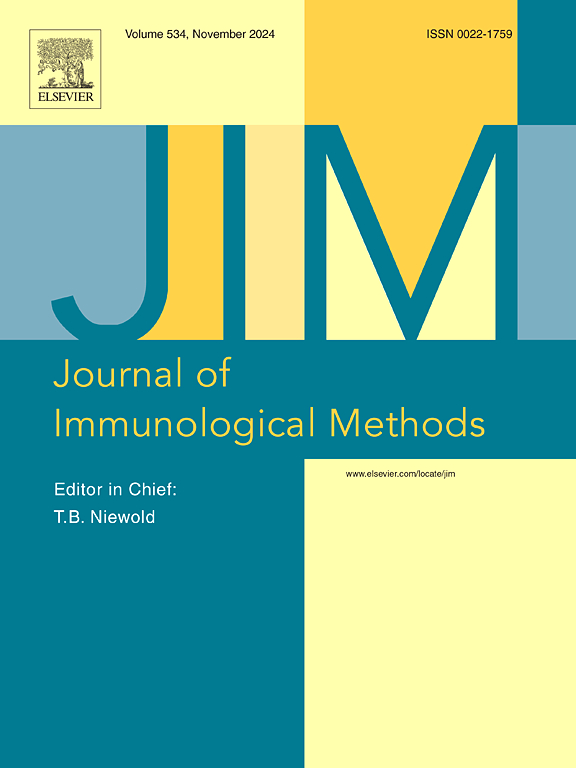Complete primer set for amplification and expression of full-length recombinant human monoclonal antibodies from single human B cells
IF 1.6
4区 医学
Q4 BIOCHEMICAL RESEARCH METHODS
引用次数: 0
Abstract
Human monoclonal antibodies (mAbs) are an important segment in precision therapeutics. Various methodologies are available for generating them. Recombinant human mAbs expression from sorted single B cells is preferred for its rapid expression using mammalian vectors while maintaining in vivo immunoglobulin (Ig) pairing. The success rate of generating recombinant mAbs from single sorted human B cells directly relies on Ig heavy (IgH) and light (IgL) gene coverage of the PCR primers. Existing primer sets fail to cover all functional human Ig gene rearrangements, exhibit high degeneracy leading to non-specific amplifications and mutations arising from primer mismatch/degeneracy, and require high amplification cycles. Some existing primer sets have high coverage but are not designed for expression as recombinant mAbs. Here, we have designed a primer set to amplify all functional V(D)J transcripts in human B cell repertoire using a nested RT-PCR approach. The resultant amplicons can be cloned into mammalian vectors for expression of recombinant mAb. Non-specific amplifications were minimized using isotype-specific primers for cDNA synthesis and limiting primer degeneracy. We validated the designed primers on single sorted B cells, bulk sorted B cells and peripheral blood mononuclear cells. We were successfully able to amplify paired heavy and light chain transcripts in 38.46 % (80/208) from naive, memory and B1 B cell subsets sorted as single B cells. Paired Ig transcripts from five single B cells were cloned into expression vectors and purified from mammalian cells as recombinant mAbs. Thus, our new primer set offers significant advantages over existing primers as it allows amplification of all functional V(D)J rearrangements, facilitating rapid generation of antigen-specific recombinant antibodies from diverse human B cell repertoires following vaccinations and infections previously inaccessible due to primer limitations.
完整的引物集用于扩增和表达来自单个人B细胞的全长重组人单克隆抗体。
人单克隆抗体(mab)是精密治疗领域的重要组成部分。有各种方法可用于生成它们。重组人单克隆抗体是首选的,因为它可以在哺乳动物载体上快速表达,同时保持体内免疫球蛋白(Ig)配对。从单选的人B细胞中生成重组单克隆抗体的成功率直接取决于PCR引物的Ig重(IgH)和轻(IgL)基因覆盖率。现有引物组不能覆盖所有功能性的人类Ig基因重排,表现出高简并性,导致引物错配/简并性导致非特异性扩增和突变,并且需要高扩增周期。一些现有引物具有高覆盖率,但不是设计用于表达重组单克隆抗体。在这里,我们设计了一套引物,使用嵌套RT-PCR方法扩增人B细胞库中所有功能的V(D)J转录本。所得到的扩增子可以克隆到哺乳动物载体中表达重组单抗。利用同型特异性引物进行cDNA合成和限制引物退化,将非特异性扩增最小化。我们对设计的引物在单个分选B细胞、批量分选B细胞和外周血单核细胞上进行了验证。我们成功地扩增了38.46 %(80/208)的配对重链和轻链转录本,这些转录本分别来自幼稚B细胞、记忆B细胞和B1 B细胞亚群,被分类为单个B细胞。将5个单个B细胞的配对Ig转录物克隆到表达载体中,并从哺乳动物细胞中纯化为重组单克隆抗体。因此,我们的新引物集比现有引物具有显著优势,因为它允许扩增所有功能的V(D)J重排,促进在接种疫苗和感染后快速产生抗原特异性重组抗体,这些抗体来自不同的人类B细胞库,以前由于引物限制而无法获得。
本文章由计算机程序翻译,如有差异,请以英文原文为准。
求助全文
约1分钟内获得全文
求助全文
来源期刊
CiteScore
4.10
自引率
0.00%
发文量
120
审稿时长
3 months
期刊介绍:
The Journal of Immunological Methods is devoted to covering techniques for: (1) Quantitating and detecting antibodies and/or antigens. (2) Purifying immunoglobulins, lymphokines and other molecules of the immune system. (3) Isolating antigens and other substances important in immunological processes. (4) Labelling antigens and antibodies. (5) Localizing antigens and/or antibodies in tissues and cells. (6) Detecting, and fractionating immunocompetent cells. (7) Assaying for cellular immunity. (8) Documenting cell-cell interactions. (9) Initiating immunity and unresponsiveness. (10) Transplanting tissues. (11) Studying items closely related to immunity such as complement, reticuloendothelial system and others. (12) Molecular techniques for studying immune cells and their receptors. (13) Imaging of the immune system. (14) Methods for production or their fragments in eukaryotic and prokaryotic cells.
In addition the journal will publish articles on novel methods for analysing the organization, structure and expression of genes for immunologically important molecules such as immunoglobulins, T cell receptors and accessory molecules involved in antigen recognition, processing and presentation. Submitted full length manuscripts should describe new methods of broad applicability to immunology and not simply the application of an established method to a particular substance - although papers describing such applications may be considered for publication as a short Technical Note. Review articles will also be published by the Journal of Immunological Methods. In general these manuscripts are by solicitation however anyone interested in submitting a review can contact the Reviews Editor and provide an outline of the proposed review.

 求助内容:
求助内容: 应助结果提醒方式:
应助结果提醒方式:


